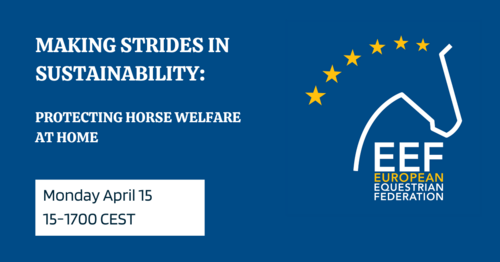EEF holds discussion on the protection of horse welfare at home
16. Apr 2024 / Category: News
EEF holds discussion on the protection of horse welfare at home
The EEF has held a panel discussion on the subject of protecting horse welfare at home.
Considering the findings of the Equine Ethics & Wellbeing Committee’s work, and recent high-profile cases of inappropriate training methods, the EEF felt it was an important topic to discuss with its National Federation members.
Before the discussion, a survey was conducted to gather insights and experiences on the specific issue of at-home training methods. Over 9000 people responded, with 94% from Europe, and the largest majority identifying as national-level riders. The survey highlighted that these issues exist from the grassroots level up and are not just a concern involving international athletes or competitors. 90% of those surveyed said they had witnessed instances of poor horse welfare at home, and 58% of those instances occurred in the last 6months. The respondents were asked to consider what they believed drove these behaviours and there was an overwhelming feeling that a combination of the money involved in the sport, competition pressures, the standard of officials within competition and specifically to dressage the overall setup of the judging all encouraged training methods that contravene good horse welfare. These findings were taken forward to set the basis of the panel discussion.
Joining a panel to cover the issue were Roly Owers, Chief Executive of World Horse Welfare, Jackie Potts, founding member of the International Grooms Association, Constanze Winter, General Counsel at the German Equestrian Federation (Deutsche Reiterliche Vereinigung / FN), Johan Fyrberg, Secretary General of the Swedish Equestrian Federation (Svenska Ridsportförbundet) and representing the EEF was Ulf Bromster, Sustainability lead.
Opening the session, EEF President Theo Ploegmakers had a clear message: “The welfare of the horses must always be paramount. It is not about being demanding, it is upholding a standard of care that every horse deserves…[..]..We need to consider what is in our control, and the control of our National Federations, and empower these Federations to enforce regulations, build on the education and protect the horse, who is the centre of our sport”.
The discussion began with talk about reporting and the lack of consensus from those surveyed for who should handle reports and the logistical challenges managing reports has. These findings were echoed by Jackie Potts who raised that even with a system, grooms were in a very vulnerable position to raise reports against their employer. Roly provided background on World Horse Welfare’s reporting centre which requires considerable resources to operate, while Constanze was able to give key insights into the amount of detail and evidence needed to fully prosecute a case which in all creates major challenges in the reporting system setup. In addition, it was highlighted that in Germany there were informal methods of reporting set up with dedicated people within each area identified to be a person to confide in and help to mediate situations that may not require full escalation and sanctions.
Closely linked to this discussion was also the need for research and studies to help provide better insights into the horse and in turn better protection for their welfare rights. This is an area that is constantly evolving, and it was agreed could benefit from more cooperation and collaboration across the industry. Sweden demonstrated strong collaboration efforts especially with their Nordic neighbours to initiate discussions and actions such as the request for a dressage forum to take several key discipline topics further into action.
The conversation then turned to the wider drivers behind poor training behaviours which survey respondents suggested were linked to money, competition pressure and in particular dressage judging and judging systems. The panel could understand these findings and expanded on the wider belief that a cultural shift is required to reset the mindsets that are opting for inappropriate methods, create clear education systems to inform on the impact of the horse and motivate individuals to take responsibility alongside the larger federations and stakeholders.
This led to a final area of discussion on how to really develop action now. Roly provided excellent insight into the need for a culture shift, and the need to empower a shared responsibility amongst the equestrian community, and this is an area that National Federations can help to cultivate through their member network. A statement shared by Roly at the beginning of the discussion rang true for our panellists; “The standard you walk past is the standard you accept” – and the need for systemic change, that truly cultivates a cultural change at every level, in which every individual feels educated and empowered to act for their horses is what is required.
This puts continuous education and development at the forefront. As the discussion showed, our standards of horse welfare are developing and things that were acceptable in the past no longer are, but these changes need sharing and educating especially for those taking a role as trainers, coaches, riding instructors and involved in educating others.
The discussions from this webinar will be continued in two weeks at the FEI Sports Forum in which the entire range of Equine Ethics and Wellbeing Recommendations will be reviewed.
The full webinar can be replayed on this link:
For more information on some of topics discussed please see these links:
Germany; information for reporting instances:
https://www.pferd-aktuell.de/ausbildung/pferdehaltung/tierschutz
https://www.pm-forum-digital.de/project/tierschutz-im-pferdesport-richtig-handeln-03-2023/
Germany; Traffic light system for warm up arenas:
Sweden: information for reporting instances:
https://ridsport.se/om-oss/hastvalfard/vad-gor-jag-om-en-hast-far-illa
Sweden: Information on the bit education system
Video: https://www.youtube.com/watch?v=JYnL77gI0LU
https://ridsport.se/om-oss/hastvalfard/munkollen/hur-gor-jag



